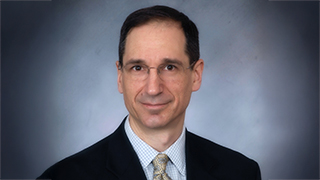Timothy Fortin Bridges the Divide Between Philosophy and Biology
Monday, June 16, 2025
 Timothy Fortin, Ph.D., associate professor and chair of Philosophical Theology in the Immaculate Conception Seminary School of Theology, received his Ph.D. in Philosophy from the Pontifical University of the Holy Cross,
Rome, Italy. He never planned to write about fatherhood, masculinity, or the adjunct
philosophy of sexual difference for his dissertation while in Rome. “The topic chose
me more than I chose it,” he says. “It’s a complicated human story.” Fortin’s research
led him to search for answers to one of the most complex questions in modern society:
What does it mean to be male or female?
Timothy Fortin, Ph.D., associate professor and chair of Philosophical Theology in the Immaculate Conception Seminary School of Theology, received his Ph.D. in Philosophy from the Pontifical University of the Holy Cross,
Rome, Italy. He never planned to write about fatherhood, masculinity, or the adjunct
philosophy of sexual difference for his dissertation while in Rome. “The topic chose
me more than I chose it,” he says. “It’s a complicated human story.” Fortin’s research
led him to search for answers to one of the most complex questions in modern society:
What does it mean to be male or female?
Fortin began teaching in the United States, continuing a journey that began in Rome
by challenging philosophical traditions related to the nature of sexual difference.
Complicated, it was and remains. His work is grounded in the writings of Thomas Aquinas,
whose original thinking was incorrect. Aquinas (and Aristotle before him) believed
in a different version of male-female conception than science revealed to be the case.
“They thought the male had the active power of generation, and the female had the
passive power—she just provided the matter,” Fortin said. “That led to Aristotle’s
infamous idea that a woman is an ‘imperfectly formed male.’ Obviously, that’s not
how human reproduction works.”
This led Fortin to wonder, “If Aquinas were alive today, what would he say, now that
we know better?” Fortin’s first book, On the Nature of Human Sexual Difference: A Symposium (Springer, 2024), was the result of this line of thinking. It brought together biology,
neurology, social science, evolutionary psychology, and reflections on Simone de Beauvoir,
Judith Butler and Thomism.
The book explores what science says about sexual differentiation, including rare intersex
and chimeric conditions. “You have to look at the most challenging cases,” he says.
“What do you make of someone born with one ovary and one testicle? Are they male or
female? Any philosophical account must answer that.”
To learn more about these complexities, Fortin spent hours in Georgetown’s medical
library, digesting dense texts in biology and neurology. “I wanted it to be a platform
for mutual understanding,” Fortin says. “The kind of post-Tower of Babel Rosetta Stone
where people from very different worldviews could at least understand why the other
says what they say.”
Fortin has always sought meaning and understanding in complex narratives, and philosophy,
he says, represented the interstices of many schools of thought that interested him.
But his path to philosophy was not linear. As a high school student, he was drawn
to literature and theology, especially the poetry of T.S. Eliot. But his father worked
in engineering, so Fortin initially followed. He enrolled at Villanova as an electrical
engineering major, but a summer volunteering with Mother Teresa’s sisters in Washington,
D.C. changed his trajectory to philosophy and psychology.
At Seton Hall since 2009, Fortin teaches History of Philosophy I, Philosophy of Being,
and Philosophy of Nature. Both seminarians and deacon candidates take his courses,
which he enjoys immensely. “It’s a great joy,” he says. “These men are discerning
lives of service, and I get to help lay their intellectual foundation.”
His next book, he says, will be a study of the psychology of sexual difference, continuing
where the last book ended. Among the questions Fortin poses in it thus far are those
asking if male and female souls exist, and what it would mean if they did. “That really
touches on transgender questions,” Fortin notes. “Could someone have a ‘male soul’
in a female body? What would that mean philosophically?” Alongside this work, Fortin
has also contributed chapters to an upcoming volume on the psychology of sex differences.
Seeking deeper meaning in all things, and the pursuit of meaning that connects us,
Fortin’s love of philosophy, theology, psychology, and biology is rooted in learning.
“Philosophy means the love of wisdom,” he says. “And that’s always worth pursuing—not
because it will make you rich or successful, but because it’s good in itself.”
Categories: Arts and Culture, Faith and Service






